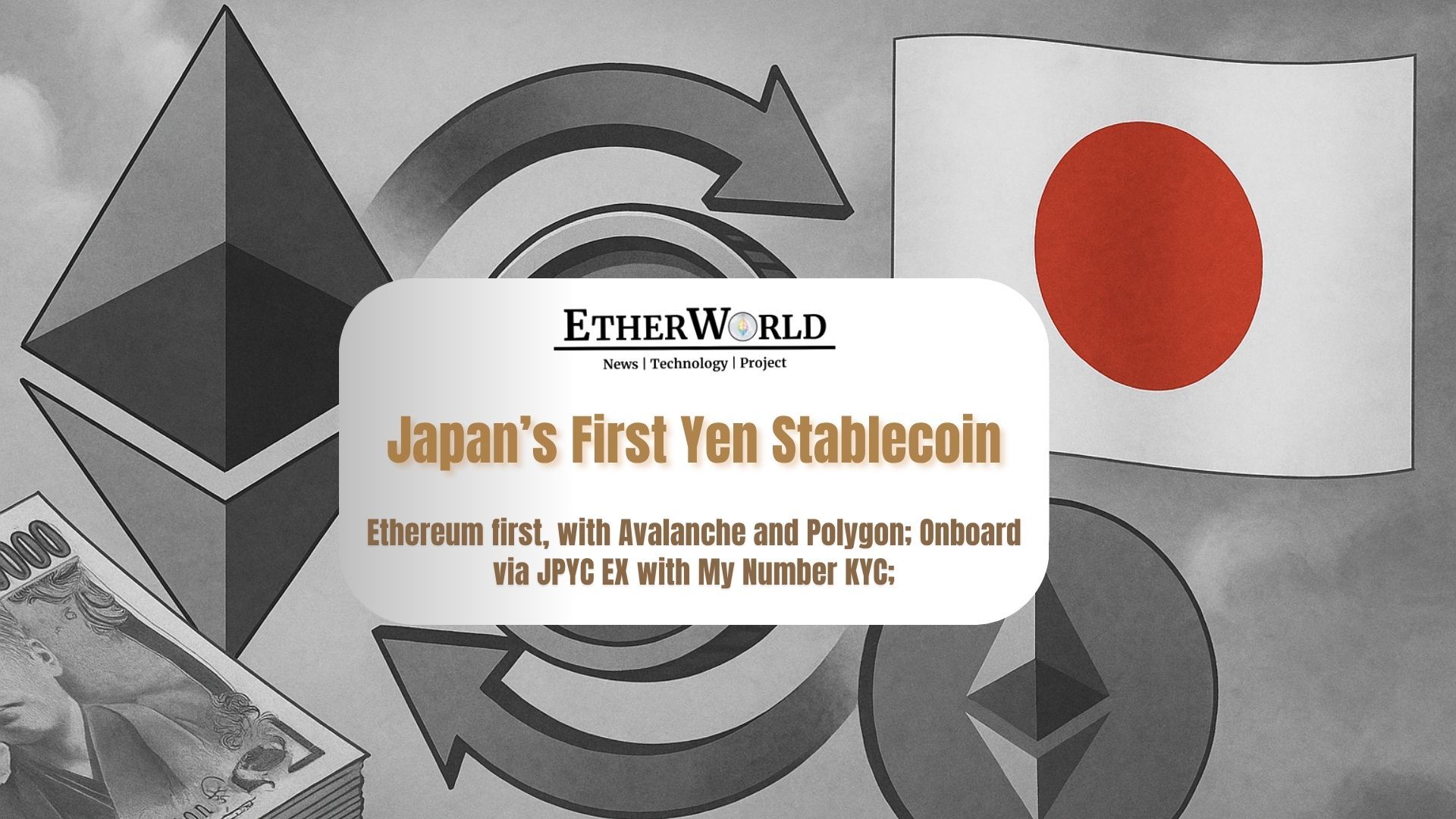Japan Puts the Yen on Ethereum: The Regulated JPYC Stablecoin's History
Japan launches JPYC, a regulated yen-pegged stablecoin, live on Ethereum, Avalanche, and Polygon, with full 1:1 redemption into JPY under Japan’s Payment Services Act.

Japan has spent the last decade building a reputation as one of the most cautious, compliance-driven nations in the crypto world. After being burned early by the Mt. Gox collapse in 2014 and later the Coincheck hack, the country stepped back and spent years constructing a regulated path for digital assets. Fast Forward to today, Japan has launched its first fully regulated yen stablecoin: JPYC,live on Ethereum.
The First Compliant Yen Stablecoin on Public Chains
JPYC is issued by JPYC Inc., a licensed fund transfer service provider supervised by Japan’s Financial Services Agency (FSA), and fully compliant with Japan’s Payment Services Act (PSA). It is redeemable 1:1 for yen, backed by reserves held entirely in domestic bank deposits and Japanese Government Bonds (JGBs). It also launches not on a private chain or a walled corporate network but directly on Ethereum, with simultaneous availability on Avalanche and Polygon. Japan has brought the yen onto public blockchains, officially and legally.
How Japan Built the Legal Path
In 2023, Japan rewrote its Payment Services Act to legally define fiat-pegged stablecoins as “electronic payment instruments”, giving them a clear legal category for the first time. The move enabled financial institutions and fintech firms to issue stablecoins under strict reserve, custody and redemption standards. Through 2024 and 2025, working groups from the FSA refined guidance for custody and intermediary roles, ensuring that distribution and redemption could happen securely under supervision. At the same time, Japan’s banks such as MUFG, SMBC and Mizuho began exploring their own yen tokens using MUFG’s Progmat platform, architected from the beginning to support Ethereum as a core chain for institutional finance.
Why Ethereum and Why Now
The timing is no accident. The world of stablecoins has been dominated by U.S. dollar tokens: Tether’s USDT and Circle’s USDC control over dominant share of the market. Asia, which processes more crypto volume than any other region, has never had a trusted on-chain currency rail in its own currency. For the first time, on-chain markets can build FX pairs like USD/JPY, businesses can design yen-based DeFi products, and enterprises across Asia can settle payments in a trusted, regulated digital yen without touching the U.S. dollar.
Designed for Real Use (Not Speculation)
Users onboard through JPYC EX, a regulated platform tied to Japan’s My Number identity system, ensuring strict KYC and AML compliance. Yen transfers in and out are handled directly via Japanese bank accounts, making liquidity paths familiar to businesses and compliant with domestic banking standards. JPYC Inc. has waived issuer fees at launch and plans to operate sustainably through interest income on JGB reserves, similar to Circle’s business model.
It aims to reach ¥10 trillion in circulation within three years and expand across more chains and payment integrations. Early enterprise partners include retail payment providers and corporate software platforms, signaling that utility is the focus.
The Beginning of an On-Chain Yen Economy
It’s also a symbolic moment for Ethereum. For years, critics argued that public blockchains could never satisfy the demands of regulated finance. Japan just proved otherwise. By selecting Ethereum as a launch chain for a fully regulated national currency token, Japan has validated as a public settlement layer for compliant financial infrastructure.
The yen is now alive on-chain. And in a multipolar world facing a slow shift away from dollar dependence, that might be one of the most significant financial moves of the decade.
Simlar Reads
- Bhutan Migrates National Digital Identity to Ethereum
- Global Digital Finance War: How 7 Nations Are Redrawing the Digital Economy Map
- India, Australia, Germany, US: A Global Look at Cryptocurrency Regulation
- How Banks Are Turning Dollars into Digital Tokens, A look at Stablecoins
- Polygon Co‑founder Sandeep Becomes First CEO, Shifts to Startup Mode
- From Ban to Boom: Coinbase’s Daring Comeback to Ignite India's Crypto Revolution
Disclaimer: The information contained in this website is for general informational purposes only. The content provided on this website, including articles, blog posts, opinions, & analysis related to blockchain technology & cryptocurrencies, is not intended as financial or investment advice. The website & its content should not be relied upon for making financial decisions. Read full disclaimer & privacy policy.
For Press Releases, project updates & guest posts publishing with us, email contact@etherworld.co.
Subscribe to EtherWorld YouTube channel for ELI5 content.
Share if you like the content. Donate at avarch.eth.
You've something to share with the blockchain community, join us on Discord!




